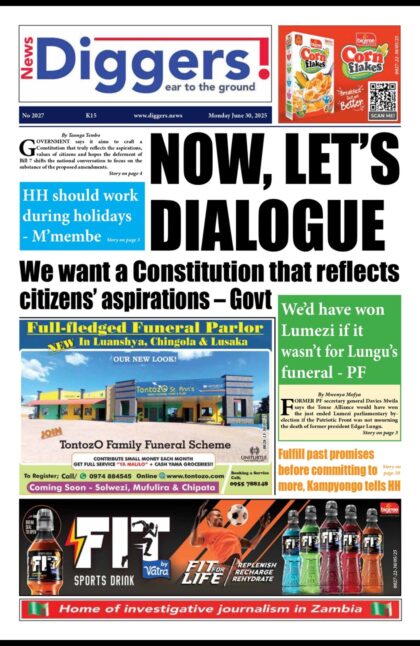PROCUREMENT entities must embrace the newly-launched Electronic Government Procurement (e-GP) system to easily circumvent the challenges of procuring supplies or services brought about by the COVID-19 pandemic, says the ZPPA.
And the Zambia Public Procurement Authority (ZPPA) says a total of 29,964 registered suppliers have so far been registered to the e-GP system during the second quarter ending June 30, 2020, up from 28,453 entities registered in the previous quarter.
Speaking during a media briefing presenting the 2020 second quarter highlights, ZPPA Director-General Christopher Chichoni announced that the e-GP system had so far proved to provide an alternative for procurement entities that were struggling to secure a steady inflow of urgent supplies amid the Coronavirus pandemic, which had devastated global supply chains because the system is paperless, among other innovative features.
Chichoni, therefore, urged procurement entities to embrace the digital system as a solution to circumvent the challenge of maintaining key supply chains.
In a bid to establish a transparent and competitive procurement system, ZPPA has been rolling out the e-GP system, which has resulted in better efficiency, more accountability and integrity in the management of public resources.
“Many procuring entities are procuring new and potentially unfamiliar supplies or services on an urgent basis, while at the same time seeking to maintain their key supply chains. Secondly, for procuring entities using the traditional manual procurement system, receipt of bids, especially from foreign bidders, has posed a challenge due to travel restrictions brought on by the COVID-19 pandemic. Some foreign bidders are finding it difficult to submit their bids on time, while others are unable to submit their bids. Lastly, due to the prescribed COVID 19 health guidelines on restriction of public gatherings, procuring entities are finding it difficult to allow interested parties to attend the bid opening ceremony. The solution to the foregoing lies in all Pes (procuring entities) embracing e-GP, which is contactless and paperless, among others,” Chichoni said.
“Other options procuring entities can consider when meeting the demands of the COVID-19 crisis include: running contracts, such as framework agreements and extending existing contracts in order to meet increased demand. Variations to an existing contract are permitted under Section 32 of the Public Procurement Act, provided that the increase in demand was unforeseen. It would be prudent for procuring entities to limit any contract modifications to what is strictly necessary in order to deal with the present crisis in accordance with Regulation 39 (5) of the Public Procurement Regulations.”
He disclosed that the Public Procurement Act, which is currently being reviewed for possible amendment, will target to include a provision to allow for mandatory use of the e-GP system.
“The Public Procurement Act No 12 of 2008 is being amended to provide for a more efficient, effective, transparent and accountable public procurement system. In addition, the amendment is necessary to address issues that are not provided for in the existing legislation, such as mandatory use of the e-GP system, assignment of procurement contracts, increased participation of citizens in the economy and benchmarked prices for commonly used items, among others. The inclusion of provisions on use of the e-GP system in the Public Procurement Bill will help increase citizen participation in the procurement process,” he said.
And Chichoni announced that a total of 29,964 registered suppliers had so far been registered to the e-GP system during the second quarter ending June 30, up from 28,453 entities registered in the previous quarter.
“During the quarter under review, 208 procuring entities were added to the e-GP system, 63 procuring entities were added for full usage while 145 procuring entities were added for Annual Procurement Plan uploads and other notifications. 1,511 suppliers were registered on the e-GP system bringing the total number of registered suppliers on the system to 29,964. This marks an increase from the 28,453 who were registered on the e-GP System in quarter one. In quarter two, a total of 183 suppliers were trained in online bid submission, 20 suppliers were trained virtually in Chipata and Kazungula, while 163 suppliers were trained in person,” said Chichoni.
“During the quarter under review, 160 tenders were processed through the e-GP system using various procurement methods. Exceptional users in quarter two were Zambia Telecommunications Company, ZPPA, National Pensions Scheme Authority, Indeni Refinery, Bank of Zambia, Zambia National Building Society, Zambia Information Communication Technology Authority, Zambia Qualifications Authority, Rural Electrification Authority, Provincial Administration Muchinga Province, Electoral Commission of Zambia, Ministry of Finance, Ministry of General Education, Workers Compensation Fund Control Board and the Zambia Revenue Authority.”
The 2030 Agenda embraces three dimensions of sustainable-economic, social and environmental development.
It has 17 Sustainable Development Goals (SDGs) that build on the progress achieved under the Millennium Development Goals (MDGs).
The importance of public procurement is highlighted by target 12.7, which focuses on the promotion of responsible consumption and production.



















